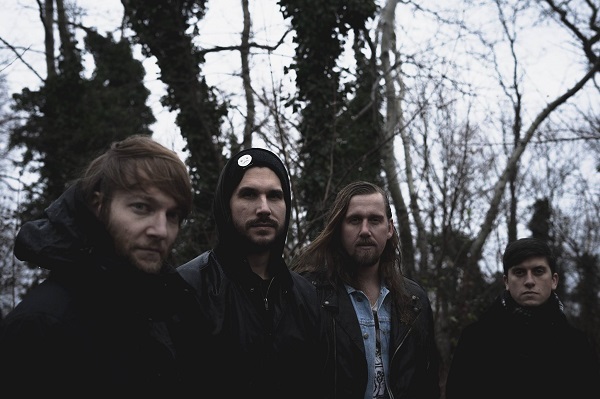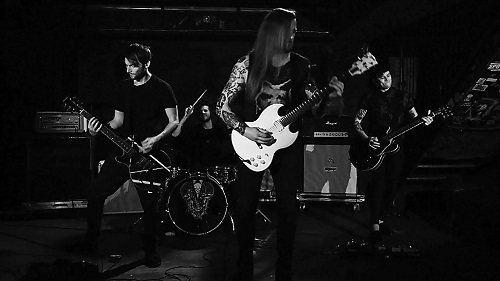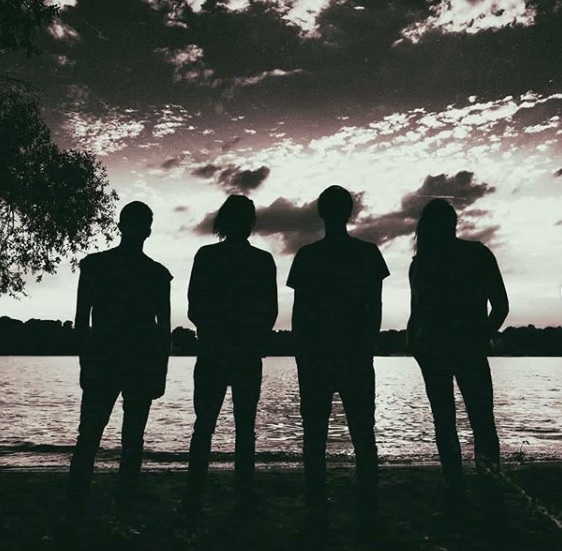Neànder
“Eremit”
Through Love Records (LP & CD)
La malinconia non sarebbe possibile senza memoria. Uno stato psichico accompagnato da una presunta immotivata tristezza. È la  caratteristica spirituale che ci rammenta frammenti di un tempo perduto, la sofferenza per attimi che non esistono più. La musica riesce ad esprimere innumerevoli stati d’animo, l’ascoltatore carpisce i momenti maggiormente comunicativi, similari alla sua orientabilità auditiva e critica. Ricordando, evocando. La bellezza e la struggente immagine del mare nordico invernale, copertina del disco creata dal batterista Basti Grimberg, ricompone il dualismo di un livido, docile crepuscolo, traportato in intenso desiderio da qualcosa di assente. Talmente palpabile da divenire forza veemente, disperazione sinistra che esprime potenza nervosa quasi crudele, efferata.
caratteristica spirituale che ci rammenta frammenti di un tempo perduto, la sofferenza per attimi che non esistono più. La musica riesce ad esprimere innumerevoli stati d’animo, l’ascoltatore carpisce i momenti maggiormente comunicativi, similari alla sua orientabilità auditiva e critica. Ricordando, evocando. La bellezza e la struggente immagine del mare nordico invernale, copertina del disco creata dal batterista Basti Grimberg, ricompone il dualismo di un livido, docile crepuscolo, traportato in intenso desiderio da qualcosa di assente. Talmente palpabile da divenire forza veemente, disperazione sinistra che esprime potenza nervosa quasi crudele, efferata.
Tormenti e sensazioni che esplodono nell’angosciata ansia di “Eremit”, secondo album della band teutonico-berlinese Neànder: Jan Korbach (guitar-bass), Michael Zolkiewicz (guitar), Patrick Zahn (guitar), Sebastian Grimberg (drums). Esploratori della  luce e delle tenebre, forgiati nel Nero Metallo ma possessori di un magico mantello d’invisibilità. Un mantello che li porta indisturbati su vette post rock, tra ampi margini progressive e dark ambient. Registrato a Berlino nello studio di Christoph Barthelth dei Kadavar, la band, perfettamente strumentale, rinuncia alla parte vocale per non cadere in definizioni scontate. Forse lo stile diverrebbe troppo etichettato, forse frullato velocemente. Il solo spartito musicale, con la maestria degli strumenti, raccoglie splendori e introspezione mentre il doom scorre impetuoso, con coraggio e spessore, a gradazione grigia.
luce e delle tenebre, forgiati nel Nero Metallo ma possessori di un magico mantello d’invisibilità. Un mantello che li porta indisturbati su vette post rock, tra ampi margini progressive e dark ambient. Registrato a Berlino nello studio di Christoph Barthelth dei Kadavar, la band, perfettamente strumentale, rinuncia alla parte vocale per non cadere in definizioni scontate. Forse lo stile diverrebbe troppo etichettato, forse frullato velocemente. Il solo spartito musicale, con la maestria degli strumenti, raccoglie splendori e introspezione mentre il doom scorre impetuoso, con coraggio e spessore, a gradazione grigia.
Brani con pose aggressive ma lirici e ossessivi, cerimoniali sonici incastonati tra illusioni e deliri di propulsivo incanto. Jan  Korbach afferma: “Abbiamo chiamato le canzoni in base alle specie di coleotteri. Così l’interpretazione rimane libera. Potete immaginare quello che volete, lasciate che la vostra fantasia possa scatenarsi. Questi nomi non sono stati usati troppo spesso nella cultura pop. I titoli mi sembrano come se fossero stati presi da una lingua segreta”. Sei pezzi maestosi in cui il riff viene lentamente ampliato e, nello stesso spazio, destituito dalla forma originale man mano che la traccia prende forma. Espansioni e decostruzioni che raggiungono dinamiche penetranti come l’acciaio di Valyria.
Korbach afferma: “Abbiamo chiamato le canzoni in base alle specie di coleotteri. Così l’interpretazione rimane libera. Potete immaginare quello che volete, lasciate che la vostra fantasia possa scatenarsi. Questi nomi non sono stati usati troppo spesso nella cultura pop. I titoli mi sembrano come se fossero stati presi da una lingua segreta”. Sei pezzi maestosi in cui il riff viene lentamente ampliato e, nello stesso spazio, destituito dalla forma originale man mano che la traccia prende forma. Espansioni e decostruzioni che raggiungono dinamiche penetranti come l’acciaio di Valyria.
La tensione drammatica di Killing Joke, le creature inquietanti dei  Black Widow, la spettrale inventiva dei Blue Oyster Cult, sembrano dissolversi tra le braccia della dea Freyja, l’armonia immateriale che penetra nei sensi umani.
Black Widow, la spettrale inventiva dei Blue Oyster Cult, sembrano dissolversi tra le braccia della dea Freyja, l’armonia immateriale che penetra nei sensi umani.
I toni oscuri e belli del principio vitale.

English translation…
Neànder
“Eremit”
Through Love Records (LP & CD)
Melancholy would not be possible without memory. A psychic state accompanied by an alleged unmotivated sadness. It’s the spiritual characteristic that reminds us of fragments of a lost time, the suffering for moments that no longer exist. Music manages to express innumerable moods, the listener captures the most communicative moments, similar to his auditory and critical orientability. Remembering, evoking. The beauty and poignant image of the winter Nordic sea, the cover of the album created by drummer Basti Grimberg, recomposes the dualism of a bruised, docile twilight, carried away in intense desire by something absent. So palpable as to become vehement strength, sinister desperation that expresses almost cruel, brutal nervous power.
Torments and sensations that explode in the anguished anxiety of “Eremit”, second album by the German-Berlin band Neànder: Jan Korbach (guitar-bass), Michael Zolkiewicz (guitar), Patrick Zahn (guitar), Sebastian Grimberg (drums). Explorers of light and darkness, forged in black metal but possessing a magical cloak of invisibility. A cloak that takes them undisturbed to post rock peaks, between wide progressive and dark ambient margins. Recorded in Berlin in the studio of Christoph Barthelth of Kadavar, the perfectly instrumental band renounces the vocal part in order not to fall into obvious definitions. Perhaps the style would become too labeled, perhaps blended quickly. The musical score alone, with the mastery of the instruments, collects splendor and introspection while the doom flows impetuously, with courage and depth, with a gray gradation.
Songs with aggressive but lyrical and obsessive poses, sonic ceremonials set between illusions and delusions of propulsive enchantment. Jan Korbach states: “We named the songs according to the beetle species. So the interpretation remains free. You can imagine what you want, let your imagination run wild. These names weren’t used too often in pop culture. Titles seem to me as if they were taken from a secret language “. Six majestic tracks in which the riff is slowly expanded and, in the same space, displaced from its original form as the song takes shape. Expansions and deconstructions that reach penetrating dynamics like Valyrian steel.
The dramatic tension of Killing Joke, the creepy creatures of Black Widow, the ghostly inventiveness of the Blue Oyster Cult, seem to dissolve in the arms of the goddess Freyja, the immaterial harmony that penetrates the human senses.
The dark and beautiful tones of the life principle.